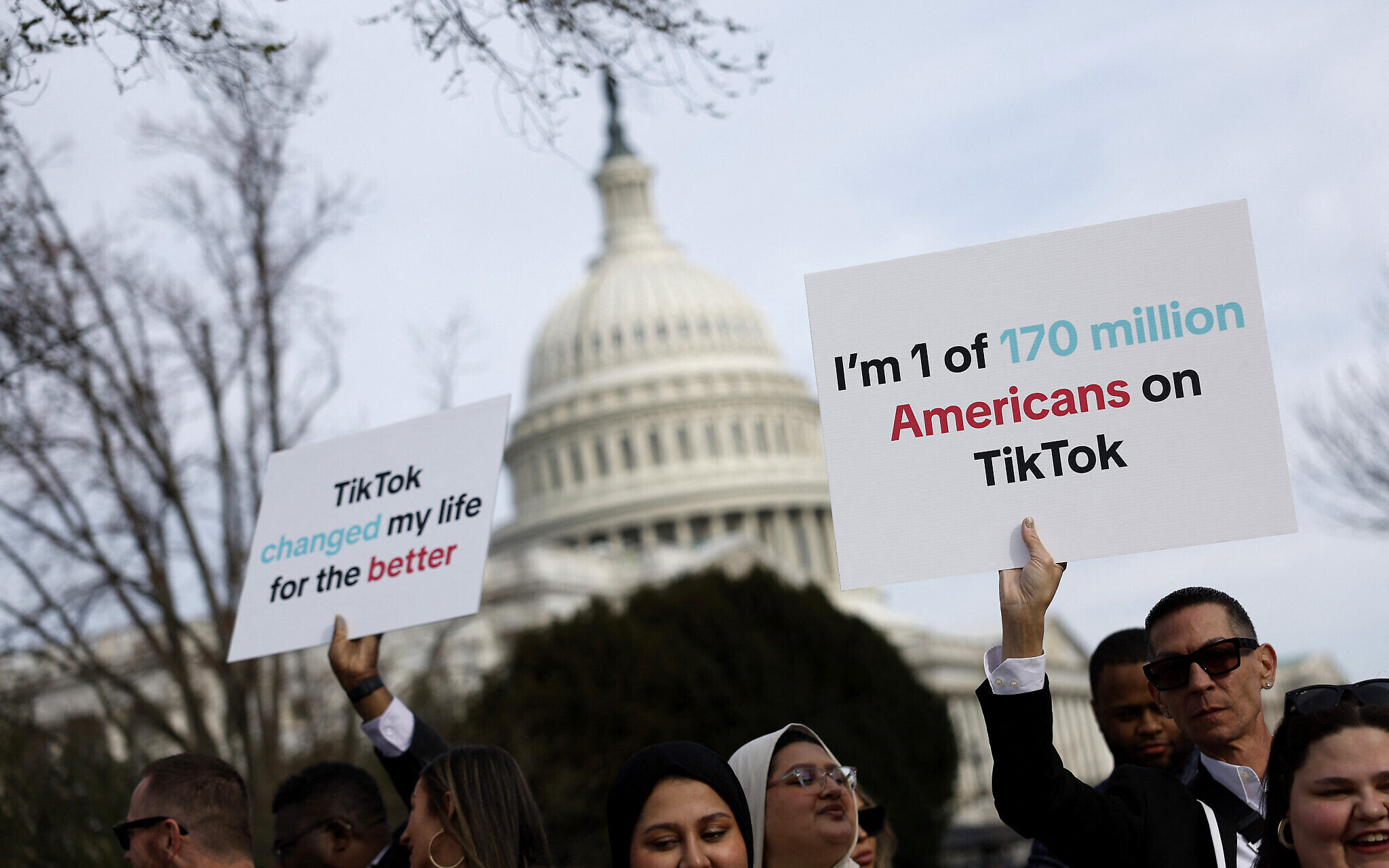Divided We Scroll Part 2: Can CEO's Message Bridge the TikTok Debate?
In this installment, we'll investigate whether TikTok's immediate public response was persuasive to these three key groups that they need to win over: older Americans, Republicans, and Non-White groups.
This week, we have been running a series of articles about TikTok's future in the US. Our first installment looked at public attitudes toward the TikTok ban bill. We found that older Americans overwhelmingly support the legislation. In addition, Republicans support it slightly more than Democrats do. And lastly, large percentages of non-White ethnic groups are still undecided on the issue.
We used the Swayable platform to run a Randomized Controlled Trial (RCT), the gold standard in scientific experiment design. We tested the effectiveness of several video clips, including TikTok CEO Shou Zi Chew's response defending TikTok, an ACLU statement opposing the bill, and an interview with Senator Josh Hawley in support of the ban.
Takeaways
- Older Americans and Republicans are key groups: Public opinion among Older Americans and Republicans leans towards a ban, making these groups crucial for TikTok's future.
- CEO's message resonates with those critical groups: Shou Zi Chew's response effectively reduced support for the ban among older Americans and Republicans who don't use TikTok.
- ACLU's message solidifies existing opposition: While the ACLU message bolstered opposition among existing supporters, it wasn't persuasive to undecided groups.
- Hawley weakens TikTok's "good for business" argument: While Senator Hawley didn't sway support for the ban, he did chip away at the idea that TikTok benefits small businesses.
CEO Shou Zi Chew was highly effective at reducing ban support among older Americans and Republicans
In contrast, CEO Shou Zi Chew's response was persuasive to key demographic groups that support a TikTok ban: Older Americans, people who don't use TikTok, and Republicans.
The results shown below are filtered to show TikTok Non-Users. Among people aged 59+ who don't use TikTok, Shou Zi Chew decreased support by a whopping 12-16 points and increased opposition by 10-12 points. Older Americans are among the most strident supporters of the ban bill, so reducing their support could have a major effect on TikTok's political future.
CEO Shou Zi Chew's response reduced support for the ban among Trump Voters who don't use TikTok by 10 points and increased opposition by 7 points.
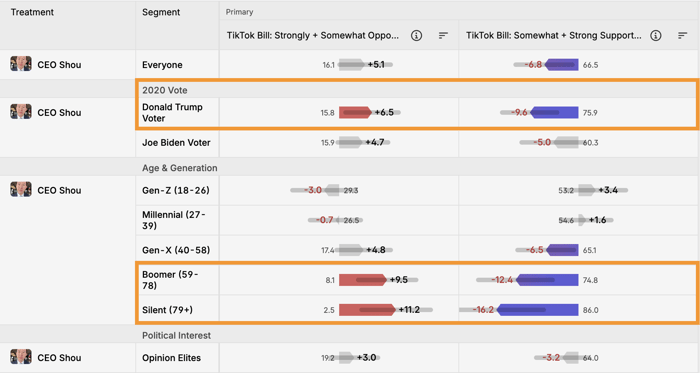
ACLU was only somewhat persuasive with groups that already support TikTok
Whereas CEO Shou Zi Chew persuaded key groups that support a TikTok Ban, we found that the ACLU largely only impacts groups that already oppose this ban. The ACLU has come out in opposition to this ban bill, saying it violates the First Amendment right to free speech. This statement was persuasive only to demographic groups that already support TikTok: young people (Millennial & Gen-Z) and TikTok Users.
The ACLU message increased opposition to the ban among Gen-Z by 10 points and among Millennials by 7 points. It also increased opposition to the ban by 6 points among TikTok users. However, it did not reduce supporters among these same demographic groups. These results suggest the ACLU shifted people from "Undecided" to "Oppose," but did not erode support for the TikTok ban.
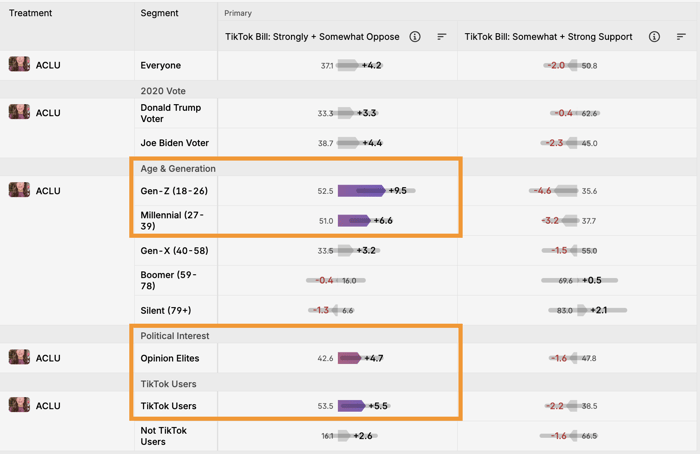
Senator Josh Hawley did not increase support for the bill, but he did decrease the belief that TikTok is good for small business
In the aftermath of the ban bill passing the House of Representatives, Senator Josh Hawley of Missouri appeared on a news program to defend the ban bill and explain why he believes this is needed. He had no statistically significant effects on support or opposition to the ban bill among any demographic groups.
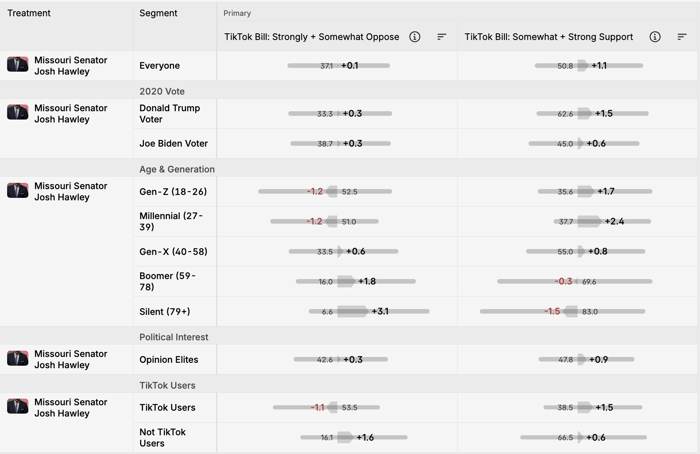
However, he was able to decrease the perception that TikTok is good for small businesses. TikTok appears to be relying heavily on convincing Americans that TikTok is good for small business, so Senator Josh Hawley's message could be a risk to this approach.
Senator Josh Hawley reduced the belief that TikTok is good for small businesses by 7 points overall. The effect was shared across the political spectrum, with both Trump and Biden voters equally persuaded. It was largely concentrated among older voters. It had a 9-point effect on Gen-X, 14-point effect on Baby Boomers, and 18-point effect on people aged 79+.
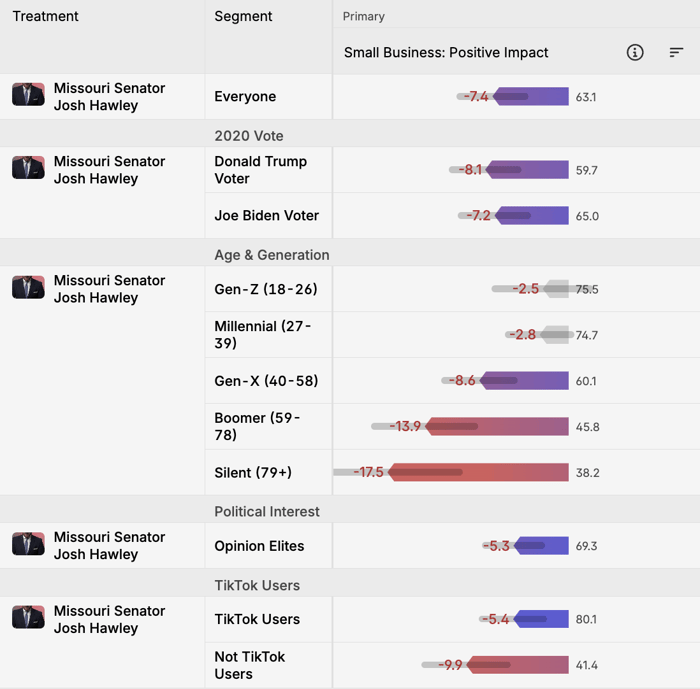
Conclusion
The future of TikTok in the US hinges on winning over older Americans and Republicans. CEO Shou Zi Chew's message appears to be a promising avenue, effectively reducing support for the ban among these demographics. The ACLU's message, while strengthening opposition among existing supporters, may not be enough to sway the undecided. Additionally, Senator Hawley's efforts, while failing to increase support for the ban, could pose a threat by undermining the narrative that TikTok benefits small businesses.
Subscribe to our blog and Book a Demo (top of this page) to learn more!
Methodology
This survey was conducted on Swayable over 24 hours between March 15 and 16 with responses from 4,885 U.S. consumers. Questions were asked of a general population sample aged 18+, using Swayable’s proprietary online platform.
The sample frame is U.S. smartphone users in all 50 states with active internet connections who are users of popular mobile and web apps that make up Swayable’s network of respondent partners. Respondents are solicited from partner apps with non-monetary reward offers for their participation. Respondents were recruited with an approximately even ratio of men and women imposed via separate quotas for each. This is a “non-probability sample” (in the conventional terminology of public opinion research, although this team’s position is that this concept is not meaningful since truly random sampling of the population is not possible via any methodology). To correct for over/under-sampling, all samples are post-stratified to the general U.S. population using cross-tabulations accounting for factors including age, ethnicity, gender, educational attainment and geography, based on the latest available data from the U.S. Census Bureau and Swayable’s proprietary population modeling. Margins of error quoted are based on response distribution statistics and sample sizes and are calculated independently for each given result.
This research was conducted and self-funded by Swayable.

